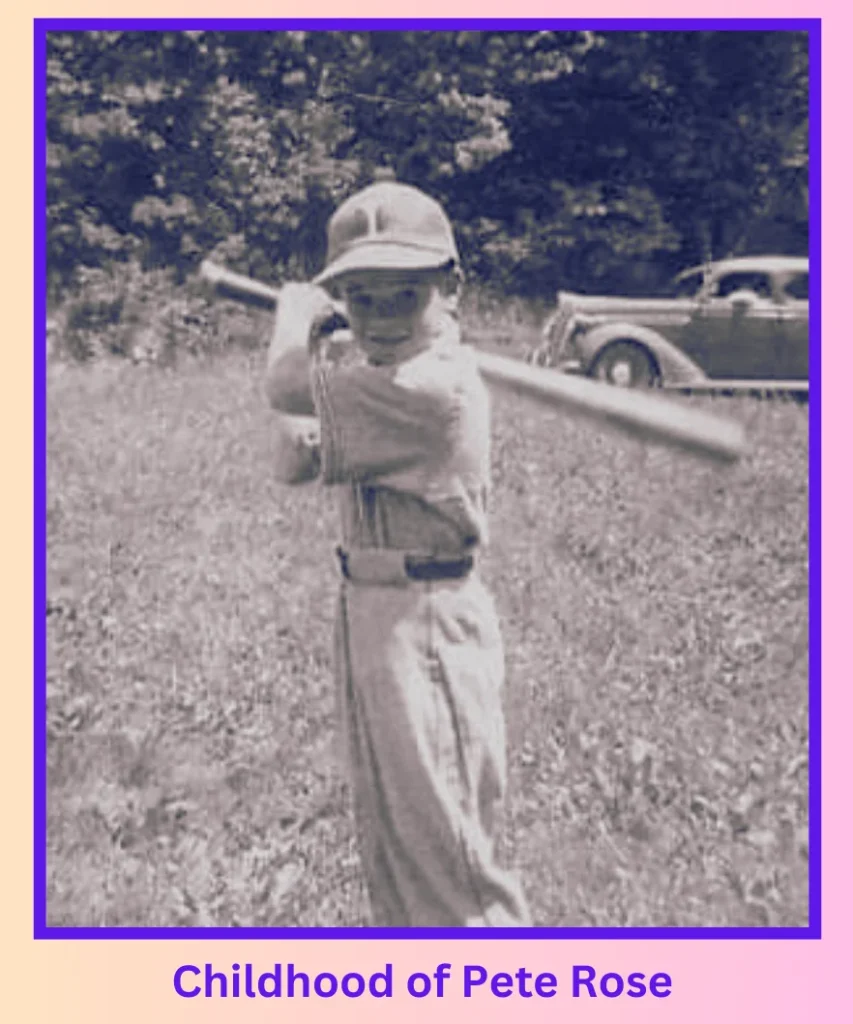
Introduction
Pete Rose, often regarded as one of Major League Baseball’s most talented and controversial figures, left a legacy that spanned both brilliance and scandal. Over his illustrious 24-year career, Rose became MLB’s all-time hit leader with an astounding 4,256 hits. He earned three World Series titles, 17 All-Star selections, and numerous accolades, cementing his place in baseball history. However, his career took a dark turn in 1989 when he was permanently banned from baseball for betting on games while managing the Cincinnati Reds. This decision overshadowed his impressive on-field achievements, leading to decades of debate about his Hall of Fame eligibility.
Rose’s impact on the sport resurfaced once more when Pete Rose, Major League Baseball’s all-time hit leader, passed away on Monday at the age of 83. The Cincinnati Reds officially announced his death, revealing he was found unresponsive at his home in Las Vegas. His passing prompted reflection on his remarkable contributions to baseball and the controversies that defined his later years.
Early Life and Background
Childhood and Family Influence
Pete Rose was born on April 14, 1941, in Cincinnati, Ohio, and from the very beginning, his surroundings would play a crucial role in shaping him into one of baseball’s most iconic figures. Growing up in a working-class family, Rose was introduced to sports at an early age, largely influenced by his father, who was an avid baseball fan.
- Birth and upbringing in Cincinnati, Ohio: Living in a city with a rich baseball tradition, the Cincinnati Reds were a significant part of the local fabric. This environment instilled in Pete a love for the game that would follow him throughout his life.
- Early exposure to sports and baseball: As a child, he participated in various sports, but baseball drew his attention. With the encouragement of his family, Rose honed his skills in neighborhood games and Little League, often using makeshift equipment fashioned from whatever was available.
- The role of family in Pete’s athletic development: Rose’s family not only supported his athletic pursuits but also emphasized the values of hard work and perseverance. These qualities became hallmarks of his eventual playing style and professional approach.

High School Career
Pete Rose attended Anderson High School, where he began to make a name for himself on the baseball field. His high school career was marked by impressive performances and recognitions that set the stage for his professional journey.
- Performance at Anderson High School: Rose emerged as a standout player, showcasing raw talent and a relentless drive. His batting average during his senior year caught the attention of college scouts and professional recruiters alike.
- Notable achievements and statistics: In his final season, he recorded a .447 batting average, earning accolades locally and establishing himself as one of the best high school players in the region. The speed and agility he demonstrated on the field painted a bright future for his baseball aspirations.
- Recognition and recruitment opportunities: His achievements at Anderson High opened doors to numerous opportunities, including scholarship offers from several colleges. However, the allure of professional baseball eventually led him down a different path.
Entry into Professional Baseball
In 1960, Pete Rose’s dream of playing professional baseball became a reality when he was drafted by the Cincinnati Reds. This marked the beginning of a storied career, full of both triumphs and trials.
- Drafting by the Cincinnati Reds: The Reds, recognizing Rose’s potential, selected him in the first round of the amateur draft. This was an emotional moment for Rose, as he had longed to play for his hometown team.
- Farm system experience: Before reaching the major leagues, Rose spent time developing his skills within the Reds’ farm system. His time in the minor leagues proved essential for refining his technique, understanding the game, and learning the intricacies of professional play.

- Major League debut and initial impact: Rose made his major league debut on April 8, 1963, and he quickly made an impression with his tenacity and work ethic. His approach to the game was characterized by a relentless pursuit of excellence, earning him the nickname “Charlie Hustle.” This dedication to hard work and effort laid the foundation for a successful and controversial baseball career, setting the stage for the legacy he would ultimately leave behind.
Major League Career
Playing with the Cincinnati Reds
Key Seasons and Performance Highlights
Pete Rose made his Major League Baseball debut with Cincinnati Reds on April 8, 1963. Over his two-decade-long association with the franchise, he became a pivotal figure in the team’s history. His performance during the 1970s was particularly noteworthy. In 1975, he achieved one of his finest seasons, amassing 215 hits and finishing with a batting average of .308. This level of consistency not only showcased his skill but also his relentless work ethic.
The Big Red Machine Era

The period known as the “Big Red Machine” marked an extraordinary time for the Cincinnati Reds, largely characterized by their dominance in the National League. From 1970 to 1976, Rose played an instrumental role in the team’s success. He was part of a talented roster that included Hall of Famers such as Johnny Bench, Joe Morgan, and Tony Pérez. Together, they won back-to-back World Series championships in 1975 and 1976. Rose’s ability to perform under pressure was evident, and his attitude set the tone for a team that was known for its aggressive play and collective tenacity.
Contributions to Team Success and Championships
Beyond just his batting prowess, Rose’s leadership skills greatly influenced his teammates. He was known for his hustle and tenacity, often leading by example both on and off the field. Rose played multiple positions, primarily as a left fielder and first baseman, allowing him to adapt to the team’s needs. His contributions extended beyond statistics; his intense passion for the game inspired a generation of players and fans alike.
Career Statistics and Milestones
All-Time Hits Leader
Pete Rose is widely celebrated as the all-time hits leader in Major League Baseball history, with a staggering 4,256 hits. This record, achieved in 1985, is a benchmark that many players aspire to but few have even come close to. His relentless approach at the plate showcased not only his talent but also his understanding of the game.
Notable Batting Averages and Accolades
Throughout his career, Rose maintained an impressive batting average of .303. He was named an All-Star 17 times and won the prestigious Gold Glove Award in 1969. Furthermore, he earned the Most Valuable Player Award (MVP) in 1973, signifying his excellence in an already competitive league. These accolades place him among the elite players in baseball history and serve as a testament to his enduring talent.
Comparison with Other Baseball Greats
When comparing Pete Rose to other baseball legends such as Ty Cobb, Hank Aaron, and Babe Ruth, it becomes evident that Rose’s achievements are remarkable. Unlike many of his contemporaries, he was known for a consistent on-field presence, playing in a record 3,562 games. While other players may have had higher home run totals or impressive slugging percentages, Rose’s ability to get on base and contribute to every game solidifies his legacy.
Transition to Other Teams
Tenure with the Philadelphia Phillies

In 1979, Rose transitioned to the Philadelphia Phillies, where he signed a four-year contract. His impact was immediate; he helped lead the team to victory in the 1980 World Series against the Kansas City Royals, marking his third championship ring. During his time with the Phillies, he registered 1,000 hits, further cementing his reputation as one of the game’s greatest hitters.
Final Years with the Montreal Expos

In the twilight of his career, Rose joined the Montreal Expos in 1984. Although his performance was not at the peak of his earlier years, he showcased the skills that had defined his career. Rose’s time with the Expos was brief—he played just two seasons—yet it underscored his professionalism and love for the game. He ended his career on a high note, gaining hit number 4,256 while donning an Expos uniform.
Impact on Each Team and Contributions
No matter the team he played for, Rose consistently left a lasting impression. His relentless work ethic and commitment were contagious. He not only contributed statistics but also instilled a sense of dedication and teamwork wherever he went. This collaborative spirit was pivotal in fostering strong team dynamics, making him a unique asset in any clubhouse.
“The only way to prove you are a good loser is to win.” – Pete Rose
Controversies and Challenges
Gambling Allegations
Initial claims and investigations
In the mid-1980s, allegations surfaced that Pete Rose, the beloved Cincinnati Reds player and manager, had engaged in gambling on baseball games, including those involving his own team. The investigation began after reports indicated that Rose had placed bets while managing the Reds. These claims prompted Major League Baseball (MLB) to open an inquiry into his betting habits, a move that would significantly alter the course of his career.
Pete’s denials and public statements
Amidst the swirling accusations, Rose consistently denied any wrongdoing. He publicly claimed that he never bet on baseball while managing or playing, asserting that his gambling activities were limited to other sports. However, as evidence mounted, including witness testimonies and corroborating documentation, the credibility of his denials began to falter. Public statements from Rose often oscillated between defiance and pleas for understanding, reflecting a complex relationship with both the media and his fans.
Impact on his career and reputation
The fallout from the gambling allegations was swift and harsh. Fans who once regarded him as a baseball icon found themselves grappling with the possibility of betrayal. His reputation, long built on hard work and dedication to the game, suffered immensely. Commercial endorsements dwindled, and the public’s adoration shifted towards skepticism. Ultimately, these controversies overshadowed his remarkable achievements on the field, leading to a complicated legacy that remains contentious among baseball enthusiasts today.
MLB Lifetime Ban
Background of the ban decision
In August 1989, after an investigation that substantiated the gambling allegations, MLB commissioner Bart Giamatti announced a lifetime ban for Pete Rose from professional baseball. The decision stemmed from a precedent set by the league’s long-standing policies against gambling, designed to maintain the integrity of the sport. This ban was monumental, marking the first time a player had been barred for such reasons and creating a lasting impact on both Rose’s career and the game itself.
Reactions from the baseball community
The lifetime ban elicited polarized reactions within the baseball community. Some players and fans supported the decision, emphasizing the importance of maintaining the game’s integrity. Conversely, others argued that Rose’s contributions to baseball, including being the all-time hit leader, deserved leniency. The debate continues to this day, as opposing camps grapple with the dichotomy of Rose’s transgressions versus his once-celebrated accomplishments.
Long-term consequences for Pete and baseball
The repercussions of the ban extend far beyond Pete Rose. For Rose, it meant a permanent estrangement from the game he loved and an end to his aspirations of eventual reinstatement. For baseball, the incident cast a long shadow, reminding stakeholders of the fragile trust between players, management, and fans. The culture surrounding gambling in sports would evolve significantly, leading to stricter regulations and greater scrutiny of players’ off-field activities.
Attempts at Redemption
Pete’s applications for reinstatement
In the years following his ban, Pete Rose made multiple attempts to seek reinstatement to baseball. Each application prompted extensive evaluations by MLB officials, but the responses remained consistent—his status as a banned player would not change. Rose argued that he had been unfairly punished and that his contributions to the sport warranted reconsideration. Nevertheless, the majority view within the MLB leadership remained resolute, largely due to the ingrained principles against gambling.
Public relations efforts and personal reflections
In an effort to reshape his image, Rose engaged in various public relations campaigns, including the publication of his autobiography, where he expressed remorse for his actions. He appeared on numerous talk shows, often baring his soul and reflecting on his mistakes, hoping to reconnect with fans. However, the sincerity of these reflections often sparked debate, with some seeing them as genuine attempts for forgiveness and others as an opportunistic effort to restore his status.
Ongoing discussions about his legacy
The discourse surrounding Pete Rose’s legacy remains a deeply divisive issue in baseball. While some continue to champion his remarkable life as a player, pointing to his unparalleled work ethic and skill, others highlight the moral implications of his actions off the field. As discussions of gambling and sports ethics become increasingly relevant, Rose’s story serves as a cautionary tale, inviting both admiration and criticism and leaving an indelible mark on the sport’s history.
Life After Baseball
Media Appearances and Public Persona
Television Appearances and Documentaries
After his exit from Major League Baseball, Pete Rose remained a prominent figure in American sports culture. He made numerous television appearances, often sharing insights on the game and on his storied career. Shows like ESPN’s “Sunday Night Baseball” and “The Mike Francesa Show” showcased his extensive knowledge of baseball, even as his past brought scrutiny. Documentaries, such as “The 5th Beatle: The Pete Rose Story,” offered fans glimpses into his life, illustrating both his triumphs and failures.
Autobiographical Works and Speaking Engagements

In attempts to set the record straight and reshape his narrative, Rose authored several autobiographies, including “My Story,” where he candidly discussed his experiences—both on and off the field. He took on a role as a public speaker, sharing lessons from his life and career with audiences across the nation, emphasizing themes of resilience and redemption.
Controversy in Media Portrayals
Despite Rose’s efforts to reframe his narrative, controversy often followed him in the media. His appearances were sometimes met with skepticism, and he was frequently portrayed as a polarizing figure. This duality—being an admired player while representing a cautionary tale—shaped how both fans and critics perceived him, ensuring that his legacy remained complicated.
Business Ventures
Restaurant Ownership and Brand Development
Pete Rose ventured into the business world by opening his own restaurants, namely “Pete Rose Sports Bar & Grill,” which catered to both sports fans and diners alike. His brand was built on his storied baseball career, yet it also represented a second chance for him to connect with the public and give them a different side of himself.
Endorsements and Appearances
Despite the controversy surrounding his lifetime ban from baseball, Rose sought to monetize his fame through endorsements and speaking engagements. He participated in various promotional campaigns linked to sports memorabilia and products while also appearing at fan conventions, where he signed autographs and interacted with fans.
Financial Ups and Downs
Though initially successful, some of Rose’s business ventures faced financial challenges. Over the years, his financial decisions, including significant gambling losses, led to fluctuations in his economic stability. These ups and downs often mirrored the turbulence of his personal life, adding layers to his public persona.
Family Life and Personal Struggles
Marriages and Relationships
Pete Rose’s personal life was as colorful as his baseball career. He was married twice—first to Karolyn Englehardt, with whom he had two children, and later to Cindy Rose. His relationships were often marred by public scrutiny, particularly in light of his past scandals, drawing significant media attention.
Impact of Controversies on Family Dynamics
The controversies surrounding Rose had tangible effects on his family. His children faced both backlash and support from fans, and the challenges stemming from their father’s troubled past often created emotional strain within the family unit. The desire for privacy often clashed with the public’s insatiable curiosity, leading to moments of tension.
Health Issues and Life Experiences
Rose faced various health issues in his later years, including significant surgeries stemming from playing injuries. These personal struggles contributed to a more reflective side of Rose, who often shared insights about coping with pain and the importance of mental resilience. His life experiences offered a chance to connect with fans on a more personal level, as many could relate to life’s challenges.
Death and Reflection
Pete Rose passed away on October 1, 2024, at the age of 83, prompting an outpouring of emotions from fans and the baseball community. The news of his death resonated deeply, as many reflected on his remarkable career and complex legacy. Public reaction varied; while some mourned the loss of an iconic player, others recalled the controversies that had defined his later years.
Tributes flooded in from former players, fans, and sports commentators. Many celebrated his contributions to the game and recognized his status as one of baseball’s all-time greats, regardless of his ban. Players who had shared the field with Rose honored his work ethic and tenacity, while commentators highlighted his unparalleled achievements and the lessons learned from his life.
History will remember Pete Rose as a figure embodying both the heights of athletic achievement and the pitfalls of personal missteps. His all-time hit record, combined with the controversies surrounding his gambling, ensured that his legacy would remain complex and multifaceted. Rose’s story served as a reminder of the fragile balance between success and integrity in the world of sports, leaving a lasting impact on how future generations view both the game and its players.
Pete Rose’s Legacy
Current initiatives to revisit Hall of Fame eligibility
The debate surrounding Pete Rose’s eligibility for the Baseball Hall of Fame continues to evolve various stakeholders advocate for his reconsideration. In recent years, several initiatives have emerged, highlighting a desire to address Rose’s exclusion from the Hall of Fame due to his 1989 ban. Advocates argue that Rose’s on-field accomplishments merit reevaluation, suggesting that a balanced view incorporates both his gameplay and the broader context of his actions. The formation of committees within Major League Baseball (MLB) considers changes in the way Hall of Fame criteria are applied has reignited discussions about Rose’s future.
Notably, the formation of the “Pete Rose Committee,” comprising players, coaches, and media, aims to create a forum where Rose’s contributions to the sport are examined alongside his controversies. This initiative indicates baseball’s readiness for a more nuanced approach to Hall of Fame eligibility, encouraging fans and historians alike to engage in discussions that extend beyond black-and-white perspectives.
Long-term implications for baseball’s Hall of Fame
The ongoing discourse surrounding Rose not only affects his personal legacy but also carries significant implications for the Hall of Fame itself. Historically, the Hall has taken a stiff stance against players who have violated the integrity of the game. Reevaluating Rose’s situation may prompt a ripple effect, leading other players with controversial pasts, such as Barry Bonds and Roger Clemens, to potentially receive similar considerations.
The underlying question is whether the Hall of Fame should prioritize character, integrity, and the historical context of a player’s career over strict adherence to the rules. Adjusting this approach could reshape the narrative around Hall of Fame selections. If Rose were to be inducted, it could set a precedent that allows for future candidates with checkered pasts to also be considered, provided their on-field merits are substantial.
How history may ultimately judge Pete Rose
As time progresses, the view toward Pete Rose’s contributions to baseball may shift significantly. Future historians and fans could take a more forgiving view, recognizing the immense skill and dedication he displayed throughout his career. Rose remains the all-time hits leader in MLB history, a record that speaks volumes about his impact on the game. Should the climate surrounding sports ethics evolve to focus on rehabilitation rather than punishment, Rose might be viewed as an example of talent mismatched with his ethical failing.
However, this shift in perception hinges on the emergence of new narratives. If newer revelations about player conduct, organizational patterns, or cultural shifts alter the status quo, Rose’s infamy could be eclipsed by the more profound histories of baseball itself. Ultimately, history’s judgment of Rose may reside in the collective memory and ongoing discussions surrounding ethics, sportsmanship, and redemption in professional sports.
Conclusion & FAQs
Pete Rose’s impact on baseball is undeniable; his record, skills, and competitive nature have left an indelible mark on the sport. Yet, alongside these accomplishments lies a complex tapestry of controversies and ongoing discussions regarding his Hall of Fame status. The current initiatives to reassess Hall of Fame eligibility, the evolving implications for the criteria of selection, and the potential for future reassessment of his legacy continue to shape dialogues within the baseball community. How future generations analyze and judge Pete Rose will be instrumental in defining not only his legacy but also the principles that govern America’s pastime.
Frequently Asked Questions (FAQs)
What are Pete Rose’s career achievements?
Pete Rose boasts a celebrated career with numerous accolades, including 4,256 career hits, 17 All-Star selections, and three batting titles. He played on three World Series-winning teams and was named the 1973 National League Most Valuable Player.
Why was Pete Rose banned from baseball?
Pete Rose was banned from baseball due to gambling on games while he was both a player and manager of the Cincinnati Reds. This action violated Major League Baseball’s longstanding policy against gambling and significantly tarnished his reputation.
Has Pete Rose ever been considered for the Hall of Fame?
Pete Rose has been eligible for the Hall of Fame since he became eligible in 1991, but his ban has precluded him from being considered. Recent discussions and initiatives seek to revisit this ban and consider Rose’s contributions to the sport.
What is Pete Rose doing now?
As of October 2023, Pete Rose remains active in baseball as a commentator, frequently participating in media appearances and autograph signing events. His public persona is still intertwined with both his achievements and controversies.
How do fans generally view Pete Rose today?
Fan opinions on Pete Rose are deeply polarized. Some celebrate him as a baseball legend deserving of recognition, while others see his ban as a necessary stand for the integrity of the game. Ongoing discussions indicate a complex legacy that continues to elicit strong feelings from both advocates and critics.
